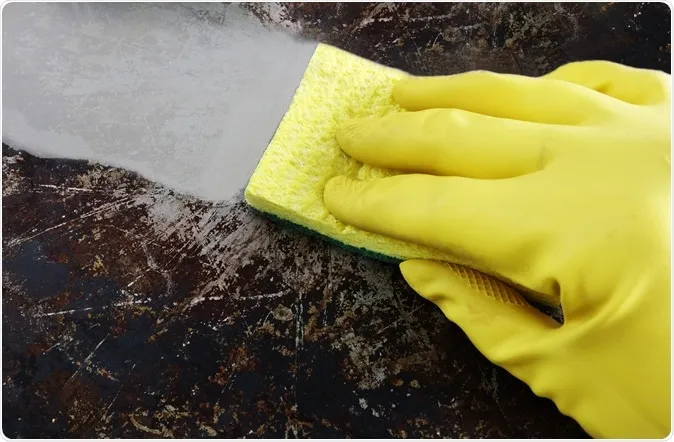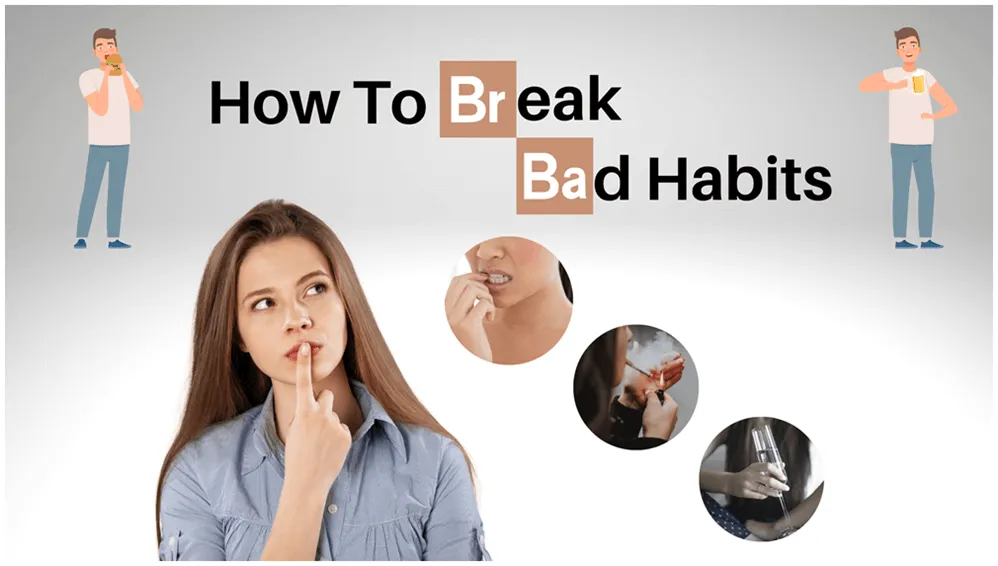Introduction
Unhealthy habits can creep into our lives without us even noticing. They can affect our physical and mental well-being.
Here are ten habits you should change now to improve your health and quality of life.
1.Not Drinking Enough Water
Water makes up 60% of your body, so it is not surprising that drinking water works for total body health. Proper hydration sharpens memory, secures a stable mood, and enhances motivation.
Fluids keep your skin elastic, cool you down when it’s hot,
Help your muscles and joints work better, and finally, help rid the toxins from your body via your kidneys.

So how much should you drink? The National Academy of Sciences recommends, that an adult male consume about 13 cups per day of fluid, and an adult female about 9.
That recommendation includes 2½ cups of fluid from foods and also counts the fluid in coffee, tea, and other soft drinks toward your fluid needs.
However, as one size fits not all, the best way to know whether you’re well-hydrated or not is through checking the color of your urine. If it is light yellow or near lemonade or straw color, then you are probably drinking enough.
2.Eating Late at Night
There are a couple of reasons to consider having dinner earlier. Researchers think that eating dinner later and close to bedtime changes how the food is processed, including how fat is processed. This could lead to weight gain, per a 2020 study in the Journal of Clinical Endocrinology & Metabolism.

Another is that you’re probably going to get a better night’s sleep; a 2020 study in the International Journal of Environmental Research and Public Health indicated that eating close to bedtime was disruptive to the quality of sleep.
But a brand-new 2022 review in Therapeutics and Clinical Risk Management says much the same thing — consumption of food within four hours of going to bed probably poses major disruptions to sleep quality in most people with GERD.
3.Not Getting Enough Excersice
The benefits of healthful physical activity are too many to mention, but we shall try. According to the Centers for Disease Control and Prevention, regular physical activity improves weight management; brain health and ability; strengthens bones, muscles, heart, and lungs; helps a person get better sleep; improves mental health and reduces the risk of depression and anxiety disorders; reduces the risk of chronic disease; improves focus and judgment; improves the ability to do daily activities easier; reduces the risk of falls; helps to manage blood sugar and blood pressure; and reduces the risk of chronic disease.
A 2020 review published in Cold Springs Harbor Perspectives in Medicine cited that exercise is associated with longer life. This coincides with the delayed appearance of at least 40 chronic diseases, such as cardiovascular disease and Type 2 diabetes.

The Physical Activity Guidelines for Americans recommend that all healthy adults get at least 30 minutes of moderate exercise five days per week or vigorous-intensity activity for at least 20 minutes three days a week, with an added recommendation of performing muscle-strengthening activities at least twice a week.
Start off easy and slowly increase the amount of exercise you do over time. Another big mistake is going all out from the start. Soon enough, you become so burned out. Set big goals, but start small and work up to your bigger goals.
4.Skimping on Sleep
You know that skimping on a good night’s rest is generally taboo, but why? Inadequate sleep can affect a plethora of other things, stated by the National Heart, Lung, and Blood Institute. For one, it will weaken your immune system, and it will also impair your judgment along with decision-making, all leading to mistakes or injuries.
Sleep deficiency is also linked to several chronic health problems, including heart disease, high blood pressure, kidney disease, diabetes, stroke, obesity and depression, per the NHLBI.

Being sleep-deprived may make it harder for you to lose weight if you’re dieting—and more likely that you’ll give in to that sweet temptation tomorrow.
While there’s no magic number of hours to sleep, and that number changes with age, NHLBI does recommend 7–8 hours of sleep each night to adults. With all that in mind, just listen to your body and try to get as much sleep as your body needs to function at its best.
5.Eating Too Much Sodium
It’s reported by the CDC that 90% of Americans take in about 1,000 milligrams more of sodium daily than we should. Restaurant foods and processed foods both tend to be very high in sodium. One of the easiest ways to reduce your intake of sodium is by cooking at home with fresh ingredients.
To further reduce the intake of sodium, throw in herbs and spices to season food prepared at home instead of salt.
6.Choosing Food Because They ‘Sound Healthy’
More and more, food labels sport health benefits on their labels. If such claims lure you in, know that just because a product lacks fat or gluten or carbs doesn’t mean it’s actually healthier. For example, fat-free products often deliver more sugar than their counterparts to make up for the flavor the product lacks from having the fat removed—and many full-fat options are the healthier choice.

Compare the nutrition facts panels and ingredient lists across brands of the same food category, and those healthy-sounding label claims won’t fool you. In fact, many of the healthiest foods in the grocery store don’t come with any packaging or branding at all: fruits and vegetables.
7.Eating Lunch at Your Deserts
It’s far too easy to munch through your midday meal at your desk. According to research published in Appetite in 2022, this form of distracted eating was correlated with higher body weight.
The researchers suggest you power down and take time away from work so you can focus on what you’re eating; enjoy it so you can tune in to when you’re satisfied.
8.Cooking Everything in Olive Oil
Olive oil overflows with heart-healthy antioxidants known as polyphenols and monounsaturated fats; however, sometimes it can be the wrong choice for cooking. Why? Well, because olive oil holds a rather low smoke point compared to other oils—literally, the temperature at which an oil begins to smoke.

When you heat olive oil to its smoke point, the beneficial compounds in the oil start to degrade, and potentially health-harming compounds form. If you’re cooking over high heat, just forget it, and move on to a different oil.
When is olive oil a good idea? For salad dressing or sautéing vegetables over medium heat.
9.Skipping Dessert
You may think that by skipping sweetened indulgences, you’re doing something positive. But science—such as the review published in Einstein (Sao Paulo) in 2022—proves that the sensation of deprivation, even while consuming large numbers of calories, results in overeating. Also, this labeling of any food as off-limits increases the allure of food.
So if it’s something sweet you’re wanting, go for it. One ounce of dark chocolate or 1/2 cup of vanilla ice cream clocks in 170 and 137 calories, respectively.
10.Not Changing or Sanitizing Your Kitchen Sponge Frequently Enough

It’s a fact you might not think about every day: Your kitchen sponge, a 2020 study in BMC Public Health says, can be a breeding ground for bacteria, molds, and yeasts; some of these microbes have the capacity to make a person sick. Moreover, every time you use the sponge to clean your sink, kitchen counter, stove, and fridge shelves, you provide perfect transportation for cross-contamination.
It is also important to sanitize the sponge in the microwave daily by running it for two minutes while it’s wet and replace often, at least every two weeks.
| Good Habbits | Bad Habbits |
| Regular exercise | Sedentary lifestyle |
| Healthy eating | Unhealthy diet |
| Sufficient sleep | Sleep deprivation |
| Time management | Procrastination |
| Gratitude practice | Complaining |
| Reading | Excessive screen time |
| Mindfulness | Worrying excessively |
Conclusion
Those bad habits, so well practiced until now, will bring us, in time, directly to the doorway of very poor physical, mental, and emotional health.
You need to think that the first steps toward a healthier, happier you are the realization of these negative patterns.Unhealthy habits, once developed, might make a big difference in our physical, mental, and emotional health.
The ability to recognize those negative patterns in the first place is what sets us toward a healthier and happier you. If you are finally able to realize the results of those habits and take deliberate action in changing them, then you are really putting an investment in your future.
It may be a little tough to break free from the unhealthy routines, but the returns, pretty huge. Small changes, when consistently applied, can make huge differences in the quality of life. Begin taking control of your health through living intentionally toward a stronger, healthier you.
FAQs
What are some common unhealthy habits?
Common unhealthy habits include smoking, excessive alcohol consumption, poor diet, lack of exercise, and insufficient sleep.
How do unhealthy habits affect me?
Unhealthy habits can lead to a variety of health problems, including heart disease, obesity, diabetes, mental health issues, and decreased lifespan.
Is it difficult to break unhealthy habits?
Breaking unhealthy habits can be challenging, but it’s definitely possible with determination and the right strategies.
Related Post:
How to Use Snapchat: A Guide For Beginners


2 thoughts on “10 Unhealthy Habits You Need to Change Now”